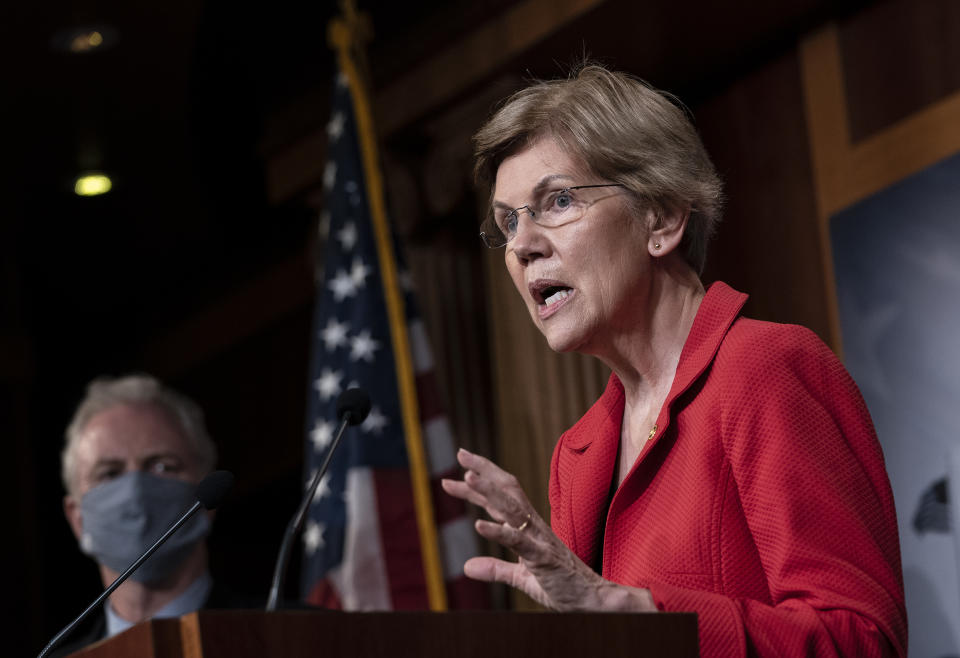1,600 customers say Wells Fargo paused their mortgage payments without their consent
Some 1,600 Wells Fargo customers say the bank paused their mortgage payments without their consent, far more than previously known, according to correspondence the bank sent to two U.S. senators in August and September.
The letters, obtained exclusively by NBC News, also indicate that the bank didn't know how many customers had been affected by its practice of placing them in so-called forbearance programs, raising questions about Wells Fargo's internal controls.
In July, an NBC News investigation detailed how Wells Fargo, in more than a dozen states, had suspended customers' mortgage payments without their permission during the Covid-19 pandemic. Placing customers in unwanted forbearance can harm borrowers' credit reports by making it seem as though they aren't making required payments when they are. The conduct can also prevent borrowers from refinancing their home loans to benefit from record low interest rates.
At the time, Wells Fargo said it was trying to help borrowers potentially harmed by the pandemic by proactively pausing their mortgage payments.
Following the NBC News report, Sens. Elizabeth Warren of Massachusetts and Brian Schatz of Hawaii, both Democrats on the Banking Committee, asked the bank for information about the practice, including how many customers had been affected.
Wells Fargo responded in August but didn't provide lawmakers with the number of customers whose mortgage payments had been suspended without their consent. The bank said it was "affirmatively reaching out to customers where we do not have evidence of a clear request for a forbearance," one letter said.
The bank did report having received 1,600 complaints of unwanted forbearances and said it had identified about 900 customers going through personal bankruptcy who had had their mortgage payments paused even though they hadn't requested it. Wells Fargo said it doesn't "receive, nor do we pay our employees, any incentive fees or other compensation for placing customers in forbearance."
Wells Fargo said it had changed its practices "to require an affirmative request from a customer before providing a forbearance." And for customers who received forbearances they didn't request, the bank said, "we are removing the forbearance, adjusting credit reporting, and working to make the customer whole."
Warren said the bank's responses were troubling. "These new details reveal that Wells Fargo's culture remains deeply broken and the bank has yet to implement the necessary structural reforms to fix the problems," she said in a statement.
Warren forwarded the Wells Fargo responses Wednesday to Federal Reserve Board Chairman Jay Powell, one of the bank's main regulators, telling him that the forbearance actions were "a systemic practice at the institution and a direct result of the company's failure to have the appropriate internal controls in place."
She asked that the Fed consider Wells Fargo's problematic conduct as it continues to monitor the bank.
Since 2018, the Fed has restricted Wells Fargo's ability to grow its assets until it "sufficiently improves its governance and controls." Warren said the bank's forbearance practices show that "much additional progress is necessary before the Fed begins to consider permanently lifting the asset cap."
A spokeswoman for Wells Fargo said the bank "continues to work diligently to provide relief to customers experiencing hardships due to the COVID-19 pandemic, including those who need a break in their mortgage payments." She also said the institution has made "transformative changes to our independent risk management structure and control organization, including important work to further strengthen the independent oversight of all risk-taking activities and a more comprehensive view of risk across the company."

In recent years, Wells Fargo, the nation's fourth-largest bank, has come under pressure for opening unrequested bank and credit card accounts for clients. It also forced others to buy auto insurance they didn't need and, in some cases, weren't told about.
Wells Fargo this year paid the U.S. government $3 billion in a civil settlement and deferred prosecution agreement related to the fake accounts scandal. Setting up the fake accounts was encouraged to prove that the bank could sell customers an array of financial products, a metric closely watched by investors.
Under the CARES Act, which provides help with loans backed by the government-sponsored companies Fannie Mae, Freddie Mac, Ginnie Mae and others, borrowers harmed by Covid-19 can ask to suspend their mortgage payments for up to a year. The amounts they owe during the period are either tacked onto the ends of the loans or paid off before. No additional fees, interest or penalties can accrue on the loans while they are in forbearance.
Customers of Wells Fargo said they were placed in forbearance after simply having requested information about Covid-19 assistance programs or having clicked on related pages on the bank's website but not signing up. Some said they continued to make their payments to the bank.
Unwanted forbearance can be problematic, especially for borrowers in bankruptcy. They might have to pay extra fees to correct the impression that they had stopped paying their mortgages, for example. Even worse, the conduct could jeopardize their court-ordered payment plans, increasing the possibility that they would have to file second bankruptcies or lose their homes to foreclosure.
"It does not appear that Wells Fargo took any measures to address its actions with the bankruptcy courts, creating problems for the customers' bankruptcy cases," Warren said in her letter to Powell.
Borrowers in Chapter 13 bankruptcy whose loans were put into forbearance by Wells Fargo without their consent have sued the bank; it recently agreed to a court order barring its forbearance conduct nationwide. Attorneys for borrowers who weren't in bankruptcy when their payments were paused have requested a similar ruling in a separate suit.
Correcting customers' credit reports marred by unrequested forbearances takes time. A Wells Fargo customer who has been working with the bank said it expects her credit report to show the correction shortly, about six months after the pause took place.
